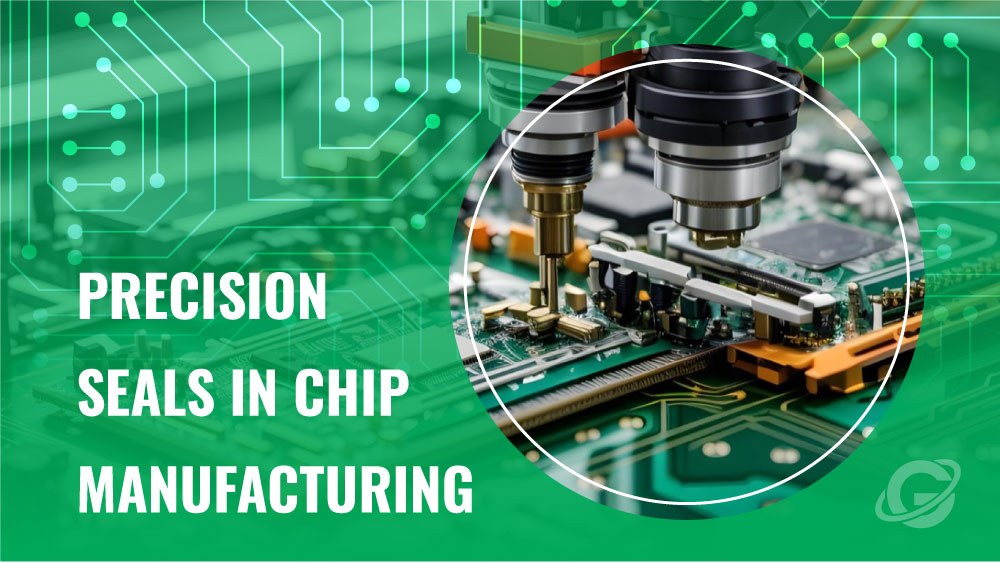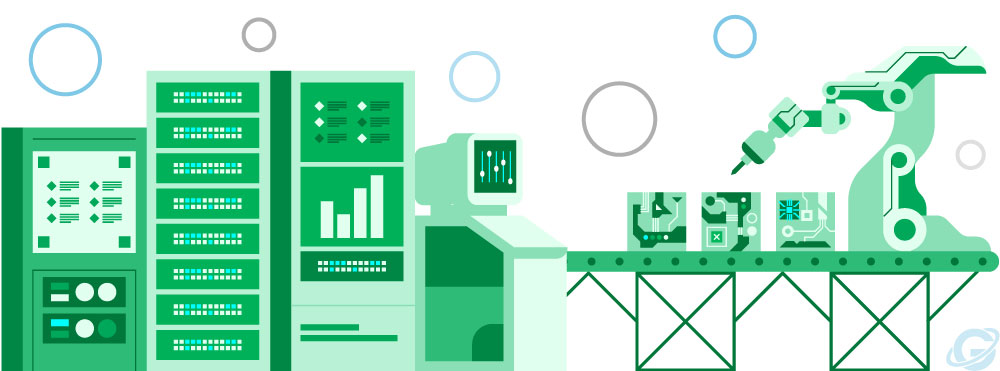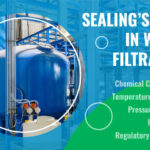
Summary
- Seals are essential in semiconductor manufacturing. They act as barriers against contamination, ensure process integrity, and maintain vacuum environments for high-precision operations.
- The durability of seals, made from materials like Viton and FFKM, is crucial under extreme conditions, preventing contamination and equipment degradation in semiconductor production.
- As semiconductor technology evolves, the demand for sophisticated seals grows, highlighting their role in maintaining the purity, precision, and reliability essential for industry progress.
Introduction
Seals play an indispensable role in semiconductor manufacturing. The semiconductor industry, a cornerstone of modern technology, demands precision, reliability, and cleanliness in every phase of its manufacturing process. Seals emerge as pivotal players, ensuring that the sophisticated machinery used in semiconductor production operates under optimal conditions. This blog explores the multifaceted roles of seals in semiconductor manufacturing, delving into their critical functions, from acting as the first line of defense against contamination to ensuring the integrity of high-precision operations. As we navigate through the significance of seals in this high-stakes industry, we uncover the essential nature of their contribution to the technological advancements that define our contemporary world.
The Role of Seals in Semiconductor Manufacturing

Seals play a monumental role in ensuring that the sophisticated machinery used to produce semiconductors operates optimally. Seals are integral to the functionality and reliability of semiconductor manufacturing equipment. Their importance spans various stages of the manufacturing process, from the initial fabrication steps to the final production phases. By understanding the multifaceted roles that seals play, we can appreciate their value in the semiconductor industry:
- First Line of Defense Against Contamination: Seals are barriers that prevent external particles or contaminants from entering the manufacturing process.
- Guardians of Process Integrity: They ensure that the processes within semiconductor manufacturing equipment are carried out without interference, maintaining the designed integrity of these processes.
- Maintaining Vacuum Environments: Seals are crucial in preserving the vacuum conditions necessary for many semiconductor fabrication processes, such as lithography and deposition.
- Ensuring High-Precision Operations: By maintaining the required controlled environments, seals enable the high-precision operations characteristic of semiconductor fabrication, ensuring the etching of intricate patterns and the layering of materials with atomic-level accuracy.
- Preventing Contamination and Defective Products: The effective functioning of seals is vital to avoid contamination that could lead to defective products and significant financial losses, emphasizing their role in maintaining quality and efficiency in semiconductor manufacturing.
The types of machinery that rely on seals underscore the diversity and complexity of semiconductor manufacturing. Lithography machines, for example, demand the utmost precision in sealing solutions to prevent any external particles from entering the susceptible operational area. Similarly, etchers, which meticulously remove layers from the silicon wafer to create the desired pattern, require robust seals to withstand aggressive chemical processes while preventing any leakage that could affect the etching precision. Deposition systems, responsible for layering semiconductor materials onto the wafers, also depend on seals to maintain the purity of the environment, ensuring the deposition of each layer with atomic-level accuracy.
Seals prevent physical leaks and ensure the integrity of the manufacturing process by protecting against contamination from various sources. The choice of seal material, design, and precise installation become paramount in ensuring that the semiconductor manufacturing process is efficient, reliable, and contamination-free. Seals’ contribution extends far beyond their simple function; they are integral to the semiconductor industry’s success, safeguarding the processes that lie at the heart of today’s technological advancements.
Precision Engineering for Microscale Efficiency
In semiconductor manufacturing, the engineering of seals and o-rings assumes a critical role, underscoring the importance of these components in technological advancement. Each step in the semiconductor production process, from lithography to etching and deposition, demands an environment meticulously shielded from contamination. This requirement places an unparalleled emphasis on the precise production of seals and o-rings. They must conform to exact specifications, ensuring an impeccable fit that forestalls any potential leakage or contamination ingress, thereby preserving the integrity of the semiconductor products.
The ramifications of even minor defects in these seals are profound, highlighting the delicate balance upon which semiconductor manufacturing teeters. No matter how minute, imperfections can cascade into significant losses in efficiency and productivity. A seemingly negligible flaw in a seal can permit the entry of contamination, leading to the production of defective chips that fall short of the stringent performance criteria expected in the industry. The repercussion of such defects extends beyond the immediate loss of materials and manufacturing time; they can delay product launches and erode customer trust, impacting a company’s reputation and bottom line.
Acknowledging the pivotal role of technology in maintaining the precision and quality of seals is essential. Here, the concept of cleanroom environments takes center stage. The semiconductor industry relies on producing seals in cleanroom settings that conform to strict International Cleanroom Standard Specifications, such as ISO-14644. These standards dictate the maximum allowable concentration of airborne particles, ensuring that seal manufacturing occurs in an environment that minimizes the risk of contamination. Using cleanroom technology in the seals and o-rings manufacturing process epitomizes the industry’s commitment to precision and quality. It’s a testament to the lengths to which the sector goes to safeguard the integrity of its products, ensuring that each component, no matter how small, contributes to the overarching success and reliability of semiconductor manufacturing.
Contamination Control: The Invisible Shield
Seals in semiconductor manufacturing environments are guardians of process integrity, ensuring that the ultra-clean conditions required for semiconductor fabrication are maintained. Even the smallest particle of dust or the slightest chemical contaminant can derail the manufacturing process, leading to defects in the semiconductor products. These defects not only compromise the performance and reliability of the semiconductors but can also lead to significant financial losses due to wasted materials and production downtime. In this context, the role of seals becomes paramount. By avoiding an airtight barrier in critical areas of the manufacturing process, seals prevent the ingress of contaminants, thus safeguarding the quality of the semiconductors.
The consequences of contamination in semiconductor manufacturing can be dire. Contaminants can cause physical defects in the chip, such as irregularities in the circuit patterns that lead to malfunctioning devices. On a more subtle level, chemical contaminants can alter the electrical properties of semiconductor materials, affecting the final product’s performance. The role of seals in mitigating these risks is critical. High-quality seals, designed and manufactured with precision, ensure that the manufacturing environment remains uncontaminated, thus preserving the functionality and reliability of the semiconductors.
However, the effectiveness of seals in preventing contamination is more than just a matter of their initial quality and installation. The dynamic nature of semiconductor manufacturing, with its complex machinery and frequent temperature and pressure changes, can wear down seals over time. This wear and tear can compromise the integrity of the seal, making regular maintenance and inspection a critical aspect of contamination control. Routine checks allow for the early detection of seal degradation, facilitating timely replacement or repair. This proactive approach to seal maintenance is crucial for maintaining the stringent cleanliness standards required in semiconductor manufacturing, ensuring that seals remain an effective barrier against contamination.
Thermal and Chemical Resistance: Seals under Stress

Seals often experience extreme conditions that test their resilience and durability in semiconductor applications. Semiconductor manufacturing processes, such as chemical vapor deposition and high-temperature annealing, expose seals to extreme temperatures and highly reactive chemicals. These conditions can degrade conventional seal materials, leading to failures that compromise the manufacturing process’s purity and reliability. The ability of a seal to withstand such conditions is critical, not only for the prevention of contamination but also for ensuring the longevity and efficiency of the manufacturing equipment. The challenges posed by high temperatures and corrosive chemicals are significant, necessitating specialized seal materials capable of withstanding these harsh conditions.
Seal materials are carefully selected based on their thermal and chemical resistance properties to meet these challenges. Materials such as Viton (FKM), which offers excellent resistance to high temperatures and chemicals, and Perfluoroelastomers (FFKM), known for their superior chemical resistance and ability to withstand extreme temperatures, are commonly used in semiconductor manufacturing. These materials ensure that seals can endure the rigors of the process without degrading, thus maintaining a contamination-free environment essential for producing high-quality semiconductors.
Seals are critical components that protect the equipment from the damaging effects of high temperature and corrosive chemicals. By preventing leaks and ensuring the containment of reactive substances, seals help prolong the equipment’s life, minimize maintenance requirements, and reduce the risk of unexpected downtime. The selection of the appropriate seal material, tailored to the specific conditions of the semiconductor manufacturing process, is a crucial factor in achieving this goal. Through their resilience and durability, seals enable the smooth and continuous operation of semiconductor manufacturing facilities, ensuring that the production process remains efficient and effective even under the most challenging conditions.
Conclusion
The exploration of seals in semiconductor manufacturing reveals their unparalleled importance in this high-tech industry’s seamless operation and success. Seals are the guardians of purity, precision, and reliability in semiconductor manufacturing. Their roles highlight the critical balance required to produce semiconductors that are the foundation of modern technology. As the industry continues to evolve, the demand for more sophisticated seals will grow, reflecting the ongoing pursuit of innovation and excellence in semiconductor manufacturing. Through their silent service, seals ensure the functionality and efficiency of semiconductor production and embody the meticulous attention to detail essential for advancing technology. As we look to the future, the role of seals in semiconductor manufacturing will undoubtedly continue to be of paramount importance, underscoring the symbiotic relationship between precision engineering and technological advancement.

 English
English  Español
Español  Français
Français  Português
Português  Deutsch
Deutsch  Italiano
Italiano  Русский
Русский  中文
中文  日本語
日本語  العربية
العربية  हिन्दी
हिन्दी 



